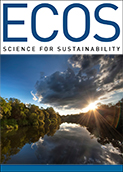
|
Published: 22 December 2014
A sense of belonging to the planet can shape perceptions of climate change
Results of a joint UK-Australia research project has found that Australians who have a stronger sense of place at the global, rather than the national, level are more likely to accept that climate change is caused by human activities.

|
|
Australian’s attachment to the places we live and our ideological beliefs are related to our climate change opinions. Credit:
©istock.com/franckreporter
|
The research shows for the first time that acceptance of human causes of climate change is linked to people's sense of place at the global level. The findings have significant implications for climate change communications and for our understanding of place and identities.
The research, conducted in Australia, was led by researchers from the University of Exeter in collaboration with colleagues from CSIRO using a survey method designed to be nationally representative.
The study found that individuals with a stronger sense of global than national connection were more likely to perceive climate change as an opportunity rather than a threat – for example, perceiving positive economic impacts to arise from climate change responses, and the potential to build a stronger sense of community worldwide.
Demographically, these individuals were more likely to be female, younger, to self-identify as having no religion, and more likely to vote Green.
People generally view a sense of place in purely local terms – the area near to where they live. The study broadens this perception in important ways to encompass national and global forms of belonging – known as place attachments and identities.
‘The results of this study suggest that [a sense of local place is] not strongly linked to climate change beliefs,’ says Professor Patrick Devine-Wright from Geography at the University of Exeter.
‘Rather, it is the interplay between national and global levels that is significant. Those with stronger global than national sense of place are more likely to accept that climate change is caused by human actions and could be an opportunity for society, to bring people together, not just a threat to the economy.’
‘Given the study was conducted in Australia, we need to replicate the study in other national contexts, for example in the UK or US, to see whether similar results will be found’.
Source: University of Exeter



